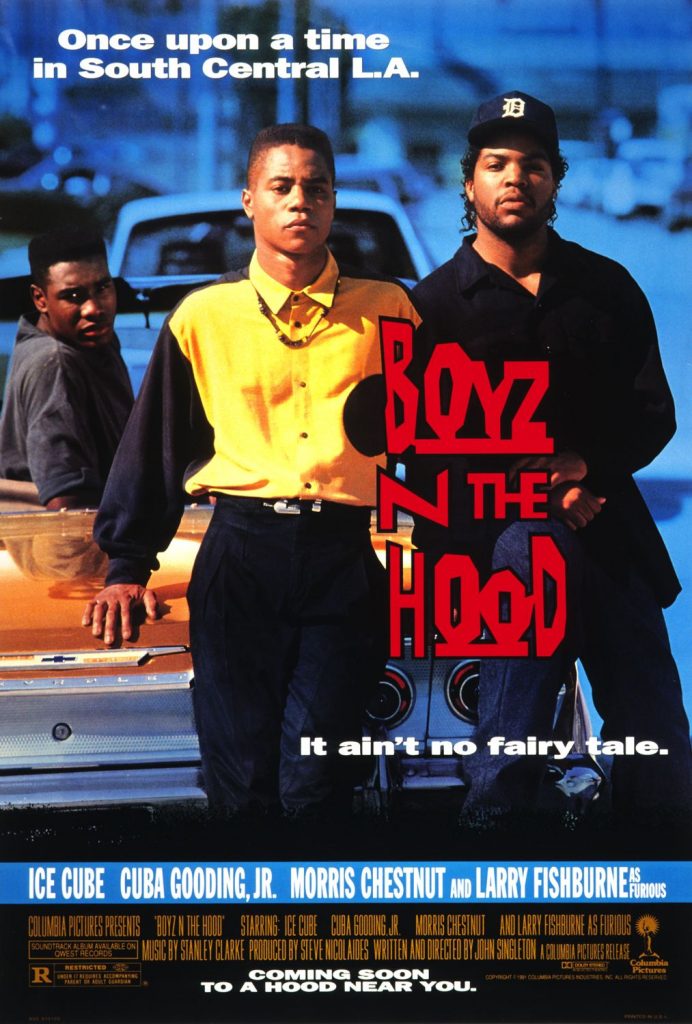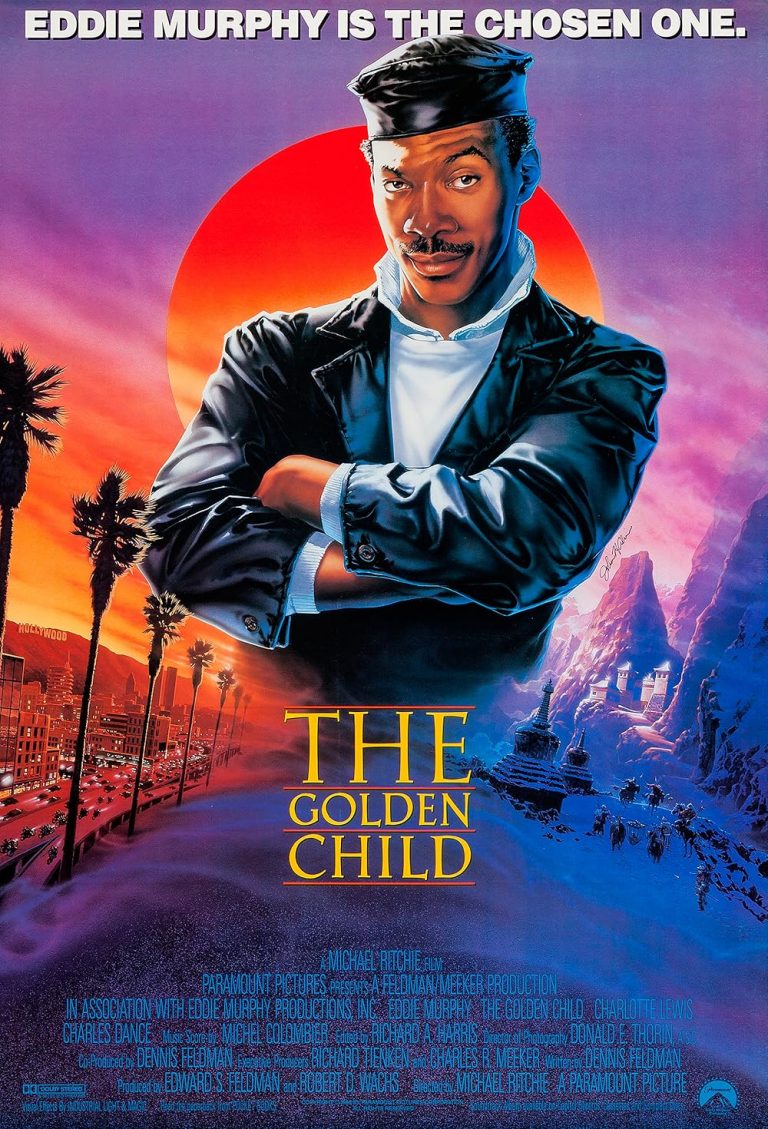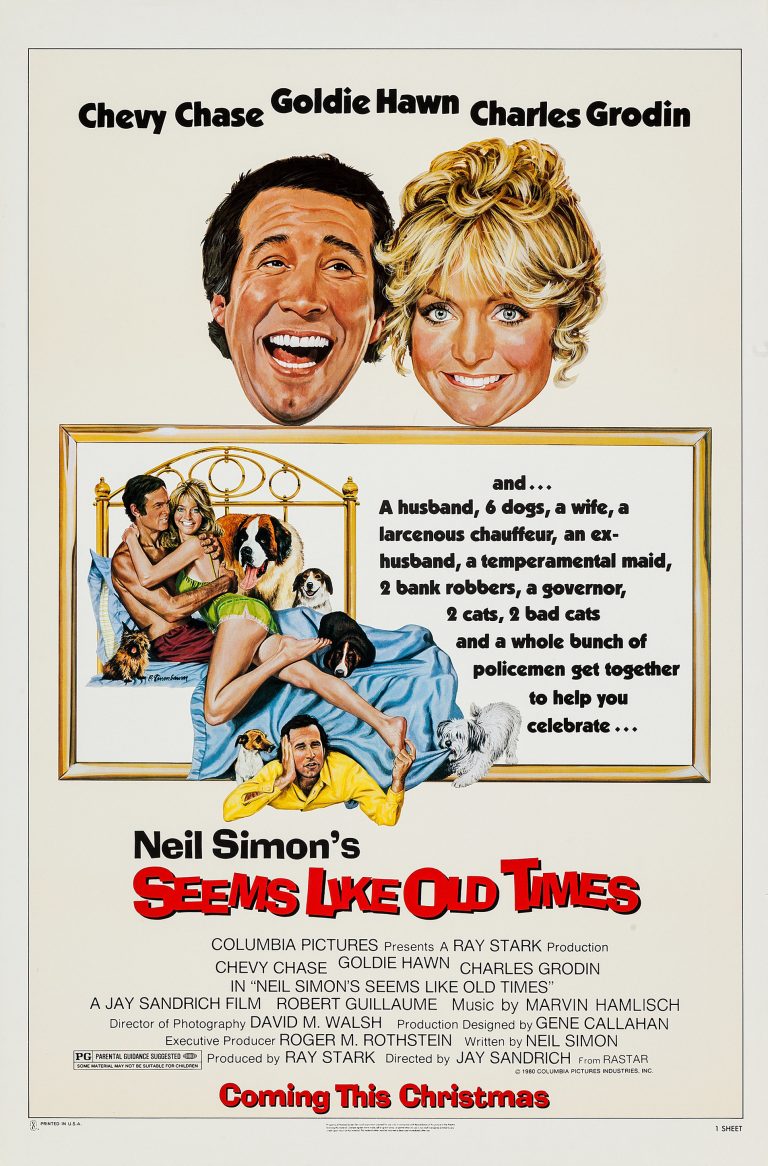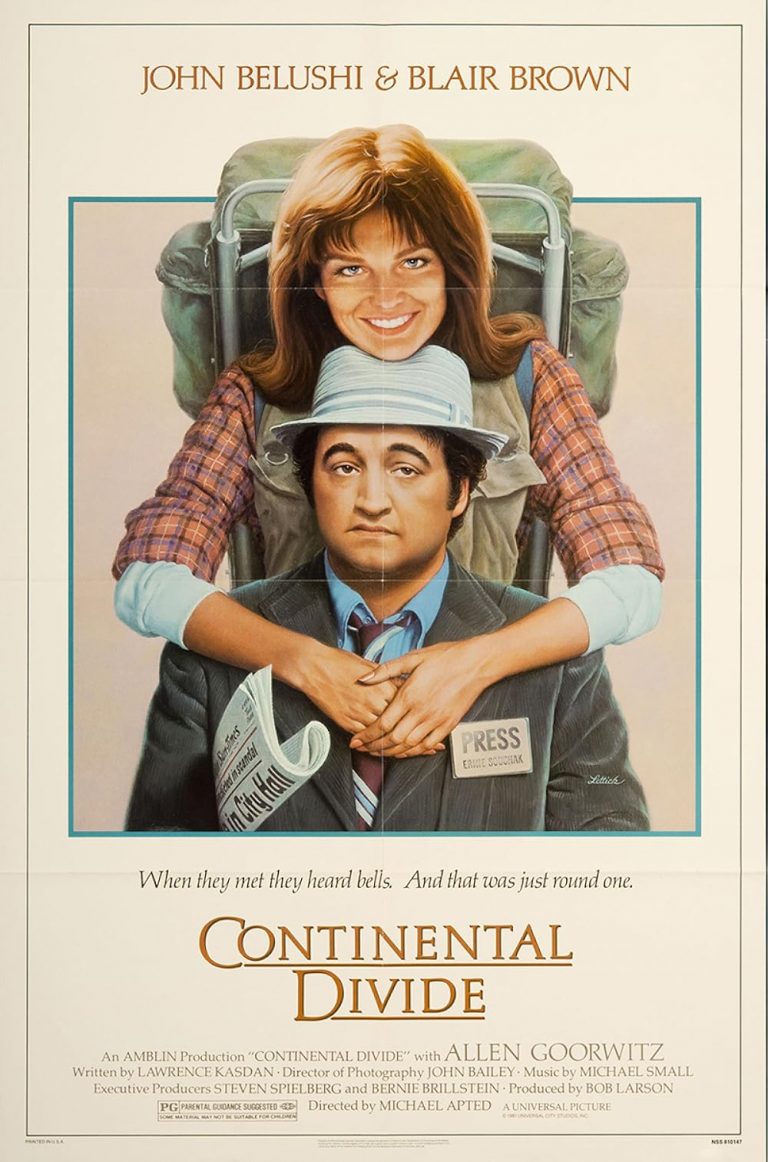Starring: Cuba Gooding Jr., Ice Cube, Morris Chestnut, Laurence Fishburne, Angela Bassett, Tyra Ferrell, Nia Long, Regina King, and a cameo from John Singelton himself
Grade: Classic
“It ain’t no fairy tale” is one hell of a tagline.
This has to be one of the biggest understatements ever.
Summary
In South Central Los Angeles in 1984, ten-year-old Tre Styles walks with his friends to school. After they stop to look at a crime scene of a probable murder, we see the kids in class later on, with young Tre acting out to get a laugh from his classmates. The teacher has him come up to the front to lecture the class as punishment, but he does so pretty confidently. Unfortunately, one of his friends tries messing with him, so they start arguing. The whole thing devolves into a fight. Later, as Tre walks home, the teacher calls Tre’s mother Reva (Bassett) and tells her that Tre is very smart, but he has a horrible temper, and he’s being suspended for a few days. The teacher then offends Reva with some questions about her life and the conversation ends with Reva saying that Tre won’t be coming back to class because he’s going to live with his father Furious Styles (Fishburne) in Crenshaw. She hangs up and then yells at Tre, reminding him that he agreed not to get into trouble. Otherwise, he would have to live with his father. She drives Tre to Furious’s house. Following Tre going to talk with his friends in troublemaker Doughboy, his athletic and good-hearted brother Ricky, and Chris, Furious goes and talks with Reva about Tre because he’s thankful for him being there. As Reva says her goodbyes to Tre, she tells him this situation is only temporary. Once she finishes her master’s, she’ll get a better job and a better place to stay. Once she leaves, Tre’s friends leave him alone for the time being because Furious immediately has Tre do some outside chores.
That night, after Furious respectfully explains the rules of the house to Tre and has him go to bed, someone tries to break into the house. As Tre wakes up to go the bathroom, Furious shoots at the man, but the man is able to escape. They talk outside while waiting for the police, though it takes them almost an hour to get to there. Finally, the police stroll in, but the black cop gives Furious a hard time for no reason. The next day, Tre waits for Doughboy and Ricky outside their house. Their mom Brenda (Ferrell), who very clearly favors Ricky over Doughboy, talks to Tre outside for the first time, recognizing him as Furious’s son. Once the boys come outside, they all notice the girl across the street, Brandi. After this, they go and grab Chris, and Chris leads them to a dead body he found. As they look at the body, a group of older teens mess with the little kids by asking for Ricky’s beloved football and not giving it back. Doughboy confronts the one guy, but he ends up beating Doughboy down. The kids leave, but one guy throws the ball back to Ricky once they start walking away. Sometime later, Furious and Tre hang out and talk about life and such. Following this, Furious drives them home to see Doughboy and Chris getting arrested. Apparently, they got caught stealing and are now going to jail, not even juvie.
Seven years later, the whole neighborhood comes out to a BBQ to celebrate Doughboy’s (Cube) release from jail. He’s now a member of the Crips too. Chris (Redge Green) is there as well, but he’s now paralyzed and in a wheelchair from the result of a gunshot wound. He’s also got two other friends he hangs with, Dooky (Dedrick D. Gobert) and Monster (Baldwin C. Sykes). Ricky (Chestnut) is now a sought-after high school football star planning on playing college ball, though he has a little son with his girlfriend Shanice (Alysia Rogers). Just then, clean cut Tre (Gooding Jr.) shows up to the party. Right away, Ricky points out Brandi (Long) to him, as he’s been on and off with her lately. Brenda greets Tre but tells him to talk to Doughboy to hopefully talk some sense into the troubled young man. Tre goes and talks with Doughboy and his friends. Once they all get some food, Brandi asks Tre why he hasn’t called. Tre avoids the question and leaves her for a moment to try and get a rise out of her as a flirting tactic (so she wants him more), but she just leaves the party instead. On the way home, Tre saves the baby of a crack fiend mother from getting hit by a car and then berates her. Immediately following this, he gets a gun pointed at his face by some random hoods in a car, in the middle of the street for no reason.
Well, that’s Crenshaw.
Tre tries his best. Thankfully, he still has strong father figure Furious in his life to give him advice. Because of this, he does a very good job at staying on the right path, despite the area he lives in. However, hood life will test him, and his friends and girlfriend will put him in situations where he has to figure out what type of man he truly is. Otherwise, he may see a similar fate as some of the terrible people he sees on the street. On top of that, his mother Reva wants him to come back to live with her but because of how long he’s been living with Furious, it’s hard for him to consider the option. The foundation he’s built is too strong. Even though Crenshaw is a bad area, he’s made too much of a life. He can’t turn his back on it, though the area may swallow him whole just as well.
Growing up is already hard enough, but life in Crenshaw is on a whole other level for Tre, Ricky, and Doughboy.
My Thoughts:
Not only is this writer/director John Singleton’s best film, but it’s also one of the best movies ever as far as the hood subgenre is concerned.
In terms of realism, Boyz n the Hood takes a look at all perspectives and that’s what I really love. You have the good kid coming from separated parents in Tre, two brothers coming from different fathers in Doughboy and Ricky, and everyone in-between. All three have vastly different motivations and personalities but when they are together, the bond is evident. Even the parents of the kids, and every side character, are compelling and well-developed, enlivening the environment they live in. This is just the tip of the iceberg with this film because though these colorful characters make up this lively and active area of Crenshaw for better or worse, the story and the message make it something spectacular and a must-watch for a coming-of-age drama. With powerful themes and substantial questions touched on such as family, friendships, parenting, fatherhood, divorce, criminal life, positive and negative influences, an “eye for an eye”, rage, vengeance, temptation, life, and death, John Singleton crafts a story that needs to be studied, along with being considered “required viewing” for those reaching adulthood. It’s a movie that goes beyond filmmaking. It’s special, and the subject matter and the specific topics covered are so tightly interwoven into the narrative that it enhances the film and the motivations of these characters to an impressive level. It truly feels like the actions of our principal characters effects everyone.
Don’t unfairly pass this off as some “hood” movie either. I don’t want you to classify it as a film focused on gang life because this generalized description only covers a quarter of this enriching story.
Furious Styles himself would look down on me for calling it such a thing. Boyz n the Hood is so much more than that.
Tre starts off as a kid that likes to mess around and has a bit of a temper, forcing him to go and live with Furious since him and Tre’s mother are separated. What I found particularly interesting was the relationship between Reva and Furious. They aren’t some argumentative divorced couple who are at each other’s throats for an exhausting amount of time. They still argue a normal amount, but they are very respectful of each other and their son, who they care for deeply. Let’s be honest, we don’t see this type of relationship with divorced parents EVER in film. Furious and Reva are both intellectual people too. When they argue, it’s not a bunch of loud noise with buzz words sprinkled over it. You actually have to sit there and listen because not only are their points well-thought-out by John Singleton, but the performance aspect draws you in because of the ferocity of both Laurence Fishburne and Angela Bassett. Neither one can give an inch to the other. They are both strong-willed, smart, and believe in what they are saying with full unbridled confidence. However, they are both too strong to give in to the other, in the most stern and respectful way possible.
There are so many emotional and memorable scenes in this classic film, but the most underrated was the restaurant discussion between Tre’s loving parents, a conversational chess match if I’ve ever saw one. At this point in the film, Furious has been running the show for the last seven years of Tre’s life. We have known to love and respect him for blessing this nice young man with a future. Reva agrees with the fact that Furious has raised Tre into becoming an upstanding young man, but she wants her boy back in her home. Despite Reva giving up Tre to his father so many years ago, it wasn’t the unforgivable move it may seem on paper either. It’s presented to us as a necessary evil that had to be done to help this family and Tre, with Bassett playing the role very sympathetically, though with a strong “had to do it, please understand” energy behind it. She’s been out of Tre’s everyday life but still sees him on the weekends throughout this time period. She has seen his growth, even though it may look like she gave up on him when he was young (in Tre’s eyes). Her getting her master’s required her full attention. The only reason this move was made was because Furious could give Tre the full attention he needed in his developing years. This is something she couldn’t have done. Once she got this out of the way and built her own foundation, she could welcome him back with open arms to give him the life he deserves. Sure, this is hard for a child to understand, but you can see why both parents’ actions were done in the manner they happened. It was all meant to help Tre. Now, she just wants her baby back since she got her degree and a new job like she promised.
It adds a very intriguing layer to a script already dealing with so many issues for our characters. It works though because of how reminiscent it is of real life, especially in the young adult phase Tre finds himself in. Though you may have one focus, there are hundreds of problems reaching the surface as you try to live your life. Boyz n the Hood encapsulates this realism of a coming-of-age story to perfection.
On the other hand, we also see Tre’s side of it because though he loves his mother, he’s grown accustomed to life in Crenshaw with his friends and Furious. Plus, she did technically leave him.
Going back to the restaurant scene, there are many conflicting thoughts we have leading up to it because we learn so much about these characters beforehand. This is why this phenomenal, arena-like matchup commencing as soon as Laurence Fishburne and Angela Bassett sit down is so engrossing. We truly believe in these two loving figures in Tre’s life, and we can’t take a side because they are both good people, with even better points. At first, I was leaning towards Furious’s argument more because if he felt Tre was old enough to make his own decisions, he’s probably right because he’s a damn good father. Then, he says a line bordering on the offensive (for a hard-working mother anyway) and says something along the lines of how she can’t act like his mother now because she missed that time on her own volition. All these years have passed and now, Tre is a grown man. It felt like an absolute dagger that hammered his point home like a sledgehammer on a two-inch nail. Right after, he plans on leaving the room to go smoke, and I was perfectly ready to chalk up this scene as “pretty good”. However, Reva’s response slapped me across the face, hitting him with a “Sit your ass down” line that grabbed me and sat me in my chair. Bassett took control and laid down the law, and I was thoroughly impressed on how she took over the scene, especially against such a strong character in Furious, as well as such a powerful actor in Fishburne.
These two characters are relatively minor compared to the grand scheme of things, especially Reva, but it just goes to show you how Singelton covers every inch of his screenplay with well-thought-out detail that affects every character in the film, no matter how big or small the role is. It felt like everything mattered. This is not a feat a lot of movies can pull off.
A special prize does need to go to Laurence Fishburne for his role as one of the best movie fathers ever in Furious Styles. He’s highly intelligent, strong mentally and physically, and he commands respect without even having to say it. Even in the hood, people respect and listen to Furious. The former war veteran is not afraid of anyone, and he also possesses a moral compass that is the perfect guiding tool for his young son, keeping him on the right path in life, despite the obviously bad neighborhood he lives in. It shows how important a strong foundation and positive influence is for a child. This foundation is what saves Tre numerous times in his life. This is just half the battle when you live in a bad neighborhood, but it can set you up for future success, as long as you buy into the advice and lessons you come across from those that have experienced it (his father and his teachings). It also shows us what having a bad foundation can do for a kid (Doughboy), as well as someone stuck in the middle like Ricky (Chestnut). Ricky is a good person, but he still has a bit of a temper that can get him into situations. His mother does give him more attention than Doughboy though, so he does have a bit of a help, it’s just slightly misguided. The experiment behind the movie is to put these three very different personalities in the same setting with different influences to see how they react to it all, giving all types of audiences an engaging experience that will yield important questions about their own lives and futures.
If Furious Styles can figure out a way to survive, be a man that one can look up to, still be a great person with strong values, and be successful, then so can his son. He’ll accept nothing less. It’s like he says though, he’s not being hard on him, although it seems like it. Furious just wants Tre to be responsible and be the best man he can be. Though it may seem unreasonable from a child’s point of view, it’s not. Some parents, especially single parents, don’t have it in them to be the man to lay down the law like Furious does with Tre. What we do know is that Tre is one lucky kid to have a parent like him that cares so deeply and is willing to go above and beyond to give him his full undivided attention to show him the right path. He’s aware of what goes in the area, and he’s aware of the people Tre hangs around with. At one point, he even talks about Tre’s friends and their lack of a father figure/mentor saying, “It’s like your little friends across the street. They don’t have anybody to show them how to do that. They don’t. You’re gonna see how they end up too”. Not only do these few lines dig deep and seem like a lot to put on this poor kid, it’s also an amazing foreshadowing, setting up the emotional back-and-forth story that will define Tre’s life. We see this line in the first half hour when Tre is still a child and honestly, this elongated intro was strong enough to be a film in and of itself. Thankfully for us, it only gets better from there because seeing what these kids become defines the movie.
This is a very gritty and realistic view of the hood life of South Central, something John Singleton has proved time and again that he understands better than anybody. Another person that understands it is South Central native Ice Cube, who plays his best role ever (with his role in the 21 Jump Street franchise being a close second). He personifies the young and troubled criminal who is supremely misunderstood. We don’t realize it until we see how his mother reacts to him, with Tyra Ferrell being the underrated gem of the movie. Cube’s performance is very raw, it is his first role after all, but he plays it very well. The fact that he’s able to garner this much sympathy as a character without shedding a tear, goes to show you how seriously he took the role and how well these characters are written. Cube is ruthless as Doughboy, but he’s also got some of the funniest lines in the movie. The best part being when the two gangs are about to fight, and Doughboy pulls out his gun. Some girl on the enemy’s side tries to calm the situation down, so Doughboy hits us with the laugh-out-loud response of “Shut up bitch”.
I will laugh anytime I see that scene. It doesn’t matter what mood I’m in.
I know it doesn’t sound funny on paper, but I assure you, within the context of the film and the heat of the moment, it’s unexpectedly hysterical. Doughboy is wildly entertaining throughout. Even in the early 1984 sequences, the character is very memorable, especially as we hear The Five Hairsteps’ “O-o-h Child” being played over the radio as young Doughboy and Chris are arrested, sealing their fate and setting up their futures with the most ironic of songs. What Doughboy becomes however is a misunderstood brother to Ricky. Though he’s a criminal, you can see the love he has for those close to him. He can have a fistfight with Ricky in one scene but defend him right after from someone else who wants a piece of him. Without a doubt, Cube’s star power helps make the role as memorable as it is, but he understood this character enough to play it with an extra level of confidence and bravado needed to make Doughboy believable. Just him taunting the bad guy gangbangers with his gun on his hip, as he holds his hands in an outstretched manner, daring them to do something, was such a defining moment for the character. When he turns that switch, and someone tests his gangster, he can turn it on. Doughboy is cold-blooded when his family is messed with and the ending because of it is absolutely riveting.
Morris Chestnut’s Ricky was likable too. You want to root for this guy. He’s got the athletic ability to make it to college sports, but there are a myriad of things holding him back in this area. There’s the asshole people, his own pride, and the fact that he has a girl and baby to worry about. You can even tell that the college recruiter is a little unsure about where Ricky’s head is at. He’s a nice kid, but his flaws are evident in many scenes such as this one. The recruiter asked him what he wanted to study in college, and he had no clue. You can tell he hasn’t even considered a scenario where he doesn’t make it pro, despite how hard it is to achieve. He has no backup plan. This is Ricky in a nutshell. Honestly, this is probably how he got his child in the first place. Ricky acts off of emotion. He’s a good person, but he has no direction, despite him being the one who got attention from his mother instead of Doughboy. At one point, Ricky sees one commercial on television, and he considers going into the army! This goes back to the importance of having a foundation, something touched on a lot because of our three main characters, their differences, and how they react to these situations.
Also, do we need to talk about the infamous “Riccccckkkky!” scene? I don’t want to spoil it because it’s one of the best scenes in movie history, but man, it was executed flawlessly. The sobering aftermath was even more devasting and the raw and emotional scene in Brenda’s home, with the screaming, crying, and confusion, is so powerful and downright riveting. I still can’t believe how well done it was for Singleton’s first movie. Cuba Gooding Jr. doesn’t get enough credit either. His intense look after everything that happens scares you because you know Tre has had enough. As a sympathetic main character, this was Gooding Jr. at his best. Seeing the emotion in Tre is heart-wrenching, as the temptation to go off the deep end reaches a fever pitch. Then again, you can’t blame him considering the circumstances.
It’s all masterfully handled by Singleton. I cannot stress this enough.
Living in the hood and getting out is a struggle a lot of people face and try to overcome. Boyz n the Hood is the representation of those that got out and those that didn’t and why. With powerful characters, an expert script juggling many different themes and plotlines at once, and direction from John Singleton that showed why he was such a force to be reckoned with in the director’s chair early on, you have a film that no doubt deserves its “Classic” label.





+ There are no comments
Add yours